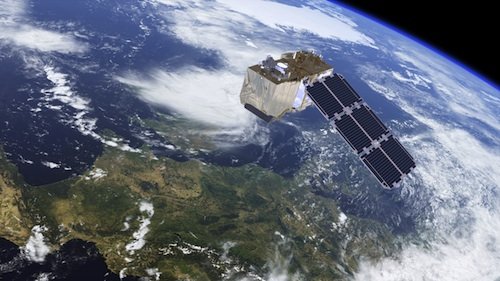
CMCC Foundation researcher A. Bombelli was recently elected as member of the ESA CO2 Monitoring Task Force. The group will collect information and data for two years in order to plan a satellite mission for anthropogenic CO2 assessment and monitoring. He was chosen as expert in the field of climate change and carbon cycle and as CMCC coordinator of GEO group. His work will be mainly focused on users’ needs.
In the light of recent Paris Agreement, the need and opportunity for an independent European capacity for CO2 anthropogenic emissions, which includes space-borne observation, has emerged.
The development, the implementation and eventually the operation of such a European capacity will need the involvement of various players, such as space agencies, operators of in-situ measurement stations and of numerical weather prediction, leading experts for modelling and data assimilation.
Following the Copernicus development plans, the Commission has set up a CO2 monitoring task force with two work packages addressing separate but interconnected tasks. The first work package (co-convened by European Space Agency – ESA and the Commission) is dealing with the Space Component (specifically: a CO2 pre-operational mission), the second work package task (convened by the Commission) is addressing the end-to-end operational emission monitoring system.
Antonio Bombelli, CMCC Foundation researcher at IAFES – Impacts on Agriculture, Forests and Ecosystems Services Division was recently nominated as member of the ESA CO2 Monitoring Task Force. Experts will collect information and data for two years in order to plan a satellite mission for anthropogenic CO2 assessment and monitoring.
The satellite mission is especially focused on large point emission sources, such as big manufacturing plants, power plants and mega-cities. The current monitoring systems are in fact insufficient to adequately capture these anthropic emission sources.
Therefore topics addressed will range from satellite’s structure, that is satellite’s technical and engineering details (i.e., the characteristics of the sensors to be used for anthropogenic emissions monitoring and assessment) to general information about greenhouse gases and carbon cycle.
The group will start a discussion about such issues while organizing workshops on a regular basis for two years.
A. Bombelli’s work in the framework of the expert group will be mainly focused on users’ needs, that is understanding user requirements of climate data by those organizations and stakeholders that are already using or could potentially use this information for improving their activities and decision-making and planning processes. He was chosen to join ESA CO2 Monitoring Task Force as expert in the field of climate change, carbon cycle and plant ecophysiology particularly with regard to terrestrial ecosystems response to natural and anthropogenic stress, including climate change. He is also CMCC coordinator of the Group on Earth Observations (GEO) having as its mission the implementation of the Global Earth Observation System of Systems (GEOSS) to meet the need for timely, high-quality long-term global information as a basis for sound decision-making; he is in particular the lead of “Global Carbon Observation and Analysis System“and the contact person of the GEO Carbon Community of practice that aim to lay the foundations for an operational Global Carbon Observing and Analysis System in support to both science and policy (for more information, see GEOCARBON project webpage).
Thanks to his participation in the ESA expert group these important and multidisciplinary communities will contribute to the discussion while bringing their expertise and needs.
Expert group activities will continue for almost two years. In case of approval, the ESA satellite mission will start in 2020.
ESA’s role in Copernicus
Copernicus is the European Earth observation program aimed at providing provide accurate, timely and easily accessible information to improve the management of the environment, understand and mitigate the effects of climate change and ensure civil security.
ESA is the coordinator of the overall Copernicus Space Component and actively contributes to it for the provision of Earth-observation data to feed into a range of services for monitoring the environment and supporting civil security activities.
The expert group for CO2 monitoring will contribute to its Climate Change Service – C3S which is still in the development phase. The service will combine observations of the climate system with the latest science to develop authoritative, quality-assured information about the past, current and future states of the climate in Europe and worldwide. Moreover, C3S will provide key indicators on climate change drivers such as carbon dioxide and impacts (i.e. reducing glaciers) to support European adaptation and mitigation policies.
Policy makers will gain a wealth of reliable information to help them better quantify the risks and opportunities linked to climate change and thereby better plan future climate policies supporting improved quality of life for European citizens.
More information are available at the following links:
- The official website of the European Space Agency (ESA)
- The page dedicated to ESA and Copernicus Space Component
- The Copernicus official website
- The Copernicus Climate Change Service official website
- The GEO – Group on Earth Observations official website
- Global Carbon Observation and Analysis System activities
- The official website of the GEOCARBON project


